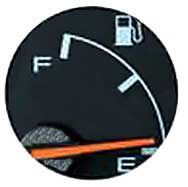Management Tools for Parking Area Sweeping |
Fuel Pricing Increases: When, How and How Much?
by Ranger Kidwell-Ross

A difficult decision many contractors have been faced with in recent months is how to pass along to customers the fast-rising cost of fuel. In some states, insurance premiums have also increased much faster than the general rate of inflation. Over the last year I have fielded an increasing number of calls from contractors about how -- or if -- they might proceed with raising their contract prices. The 'if' comes into play because, most of the time, ongoing customers for parking area and street sweeping have a contract that may or may not contain any type of escalation clause. Before discussing the information I received from interviewing some experienced sweeping company representatives on this topic, let's first discuss the issue of having such a clause in your contract. As has become very clear during the current fuel price escalation, that type of clause can be an important part of your contract. You may choose to have a standard clause allowing a rate increase based upon general cost increases. These types of clauses are often based upon the Consumer Price Index. Depending upon the type of sweeping you perform and other factors, you may want to clause that is specific to fuel or other specified business costs. However, even if your contract has no such clause that doesn't mean you can't impose either a surcharge or a general price increase and see what happens. In a situation like what we have today, where everyone is well aware of the rising cost of fuel, most of the time your customers will go along with a reasonable increase in the cost of their sweeps. They understand that it's a cost all of us are having to shoulder. Most of your customers have, themselves, experienced rising costs in a variety of areas as a result of the cost of fuel going up. When they do impose a price increase, most contractors will first send a letter of explanation to their customers. A few, however, tell me they have just added onto their invoice a surcharge amount labeled "Fuel Cost Increase" and then field customer calls when they react. Although there's never a way to predict with certainty what will occur in a situation like this, through the years most contractors have told me that by far the majority of their customers have gone along with any requested price increases, even if they had a contract with no escalation clause. Most also admit they don't press the increase onto unwilling customers. Instead, they track the situation and waited until the contract comes up for renewal. For renewal, they impose pricing that reflects the loss of profit they've experienced during the contract term. 
Karl Stauty, principal with Virginia-based Commercial Power Sweeping, said that he tends not to use a fuel surcharge as a way to gain a price increase. "When we put on surcharges in the past, our feedback from a number of our clients was that they preferred for us to renegotiate the entire contract, instead," said Stauty. "They prefer we add in the increase we need and then re-submit the contract to be re-signed. The reason is that in our area, many local property managers report to their company's headquarters, which are located in another part of the country. "They don't like to see surcharges because then it's shown as a line item that catches their bosses attention. They'd rather just put into place a new, higher cost contract since that is less likely to require explanation or, many times, even be noticed. The way we do it is to figure out what percentage amount we need to increase each of our contracts and work with each individual property manager on the issue. "Property managers do their budgets in September - October, so it's much better to have any needed price increases to them prior to that. Since insurance can go up significantly from year-to-year, we have also found it helpful to have our insurance renew in June. That gives us a 'heads-up' on how much that factor will increase our overall cost of doing business, as well. "Even though our customers might legally be able to say no to a price increase, the reality is that most are sympathetic to what's going on. They realize we can't continue keep providing the excellent service they have come to expect from us at the same price level since fuel costs have gone up so much." 
Miyee Vejer, sales executive with San Diego's Day and Night Power Sweeping, said their management team believes that a key piece of the pricing puzzle is to first do everything to keep fuel prices as low as possible. For example, said Vejer, "We are now using a commercial fuel vendor, getting all of our fuel at that company's stations. We have also re-routed our parking area routes to make them as fuel-efficient as possible. "In terms of pricing increases, when contracts come up for renewal we are increasing all of our accounts a standard percentage we have computed will account for current cost increases. For some properties, we have discussed with them the need for an increase -- even though they may be under contract -- and in most all of those cases have instituted a mutually agreed upon fuel surcharge. "We prefer listing any such increases based on fuel as a line item called a 'fuel surcharge,' because that brings it to everyone's attention that it's something that will be pulled whenever prices go back down. However, there are some instances where property managers would rather just have us increase their overall cost, so in that case we simply charge an increased price per sweep. "Our reputation is based on honesty throughout every facet of our business, and our customers appreciate that we treat them in that fashion. We believe that's of extreme importance to our business. When we are forced to inform our customers that we need to have an increase in our contract pricing for a reason like the current fuel price increases, I'd estimate that 70 percent are okay with it. With the other 30 percent we have to evaluate what to do. Sometimes, that's to wait until the contract comes up for renewal and put the needed increases in place at that time." 
Daniel Dodson heads up Oregon-based Great Western Sweeping. "What we have done with our sweeping business," said Dodson, "is to impose a 5% price increase pretty much across the board. With our municipal contracts, we are waiting until the contracts come up for renewal before putting the increase into effect. "Most municipal contracts allow an interim increase based on the Consumer Price Index. However, there are a number of different Consumer Price Indexes to choose from and contracts typically neglect to specify which particular index will be used. Then, when the time comes for an increase the contract managers invariably choose the particular CPI that's most beneficial to them. Sometimes, a city will even want us to use one CPI in one year and a different, more favorable one to them, the next. "In my opinion, what we should have is standardized use of the CPI for the manufacturing sector, since our costs are similar to manufacturing. That particular CPI index includes energy and fuel costs, health and insurance benefits, etc. These are the items that most closely reflect sweeping industry costs. Certainly more so than the CPI index that covers employees, anyway. The end result can be significant: In recent years, the CPI changes for employees has been in the range of 1% - 2%, rather than the 5+% we've seen in the more relevant manufacturers' index. "There is sometimes also a clause that allows us to get an increase if we can show there have been cost increases that are 'more than a reasonable amount above the CPI.' In our experience, those are tough to get from municipalities, though." 
Tim Weinert is a principal with Whirlwind Services, Inc. The company has offices that span from Portland, Oregon, to within 20 miles of the Canadian border to the north. "It's not just fuel," said Weinert. "As a result of the fuel increases, everything is costing more. There was very little inflation for years, and we could live with contract renewal increases of just 1 - 2%. Now, we have to look much harder at our entire cost structure when we re-negotiate our contracts. "One of the ways we are able to keep good people is to provide parity wages, since there is quite a difference in cost of living between our different office locations. So, in addition to increases in obvious areas like fuel, we also are trying to pay attention to the cost of living in each of the markets we serve, since that's where our workers come from. 
"Our management philosophy at Whirlwind Services is that when we enter into a contract then that's the agreement to the end of the contract period. We have not gone back to any customers during the time their contract is in force and asked for an increase. Cost increases are done, when needed, as contracts expire. Once we enter into a contract then we live with it for the specified time period. "We have 150 employees and do a wide variety of other services besides sweeping. Being a larger organization and committed to data tracking as a management philosophy, we are able to implement very good tracking on our costs. We do this via GPS on our vehicles and support that by dedicated data-tracking software. I think that allows us to provide very competitive rates that are, at the same time, profitable for us across the board. To date, this has allowed us to remain profitable without having to go to our customers for interim price hikes." Pete Linaris is vice president of Phoenix-based J and S Sweeping, Inc. "As of this year we are specializing in construction sweeping and no longer do parking area sweeping," said Linaris. "Construction sweeping is not typically done on an ongoing contractual basis. So, it's easy to respond to any type of cost increase by just raising our pricing structure. "Last year, when fuel prices went up as we were still doing parking lot sweeping, what we did was send out letters to our clients advising them that in six months we'd be imposing a 10% price increase. To my knowledge -- and perhaps this was because of the lead time we'd given them -- when the six months was up all of our customers went along with the price increase. The lead time was enough to allow them to consider both the increase and the level of service we provide. Then, when we finally put the increase in place, our customers took it in stride." There are some real world examples of what other contractors are doing to keep profitable in this time of rising fuel, and other, costs. Remember: If you have a customer where you're doing the work and not making a profit, then it's an account you need to give to your competition! About two decades ago I saw a sign on the wall of a body shop that said something like: "The sure way to bankruptcy is to win all the low bids." That saying is as true today as it was back then. If that adage describes how your sweeping company is being kept busy, then maybe it's time to have a sign made for your wall. Ranger Kidwell-Ross is editor of WorldSweeper.com. If you have new information to provide on this topic, let him know and we can add it in as an addendum to this article. |
© 2005 - 2012
|
Parking Area Sweeping Contents
|